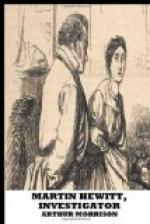“Look here,” said Kentish one day, “I’ll put you on to a good thing, my boy—a real good thing. Of course you know all about the Padfield 135 Yards Handicap being run off now?”
“Well, I haven’t looked into it much,” Hewitt replied. “Ran the first round of heats last Saturday and Monday, didn’t they?”
“They did. Well”—Kentish spoke in a stage whisper as he leaned over and rapped the table—“I’ve got the final winner in this house.” He nodded his head, took a puff at his cigar, and added, in his ordinary voice. “Don’t say nothing.”
“No, of course not. Got something on, of course?”
“Rather! What do you think? Got any price I liked. Been saving him up for this. Why, he’s got twenty-one yards, and he can do even time all the way! Fact! Why, he could win runnin’ back’ards. He won his heat on Monday like—like—like that!” The gaffer snapped his fingers, in default of a better illustration, and went on. “He might ha’ took it a little easier, I think; it’s shortened his price, of course, him jumpin’ in by two yards. But you can get decent odds now, if you go about it right. You take my tip—back him for his heat next Saturday, in the second round, and for the final. You’ll get a good price for the final, if you pop it down at once. But don’t go makin’ a song of it, will you, now? I’m givin’ you a tip I wouldn’t give anybody else.”
“Thanks, very much; it’s awfully good of you. I’ll do what you advise. But isn’t there a dark horse anywhere else?”
“Not dark to me, my boy, not dark to me. I know every man runnin’ like a book. Old Taylor—him over at the Cop—he’s got a very good lad at eighteen yards, a very good lad indeed; and he’s a tryer this time, I know. But, bless you, my lad could give him ten, instead o’ taking three, and beat him then! When I’m runnin’ a real tryer, I’m generally runnin’ something very near a winner, you bet; and this time, mind this time, I’m runnin’ the certainest winner I ever run—and I don’t often make a mistake. You back him.”
“I shall, if you’re as sure as that. But who is he?”
“Oh, Crockett’s his name—Sammy Crockett. He’s quite a new lad. I’ve got young Steggles looking after him—sticks to him like wax. Takes his little breathers in my bit o’ ground at the back here. I’ve got a cinder-sprint path there, over behind the trees. I don’t let him out o’ sight much, I can tell you. He’s a straight lad, and he knows it’ll be worth his while to stick to me; but there’s some ’ud poison him, if they thought he’d spoil their books.”
Soon afterward the two strolled toward the taproom. “I expect Sammy’ll be there,” the landlord said, “with Steggles. I don’t hide him too much—they’d think I’d got something extra on if I did.”
In the tap-room sat a lean, wire-drawn-looking youth, with sloping shoulders and a thin face, and by his side was a rather short, thick-set man, who had an odd air, no matter what he did, of proprietorship and surveillance of the lean youth. Several other men sat about, and there was loud laughter, under which the lean youth looked sheepishly angry.




